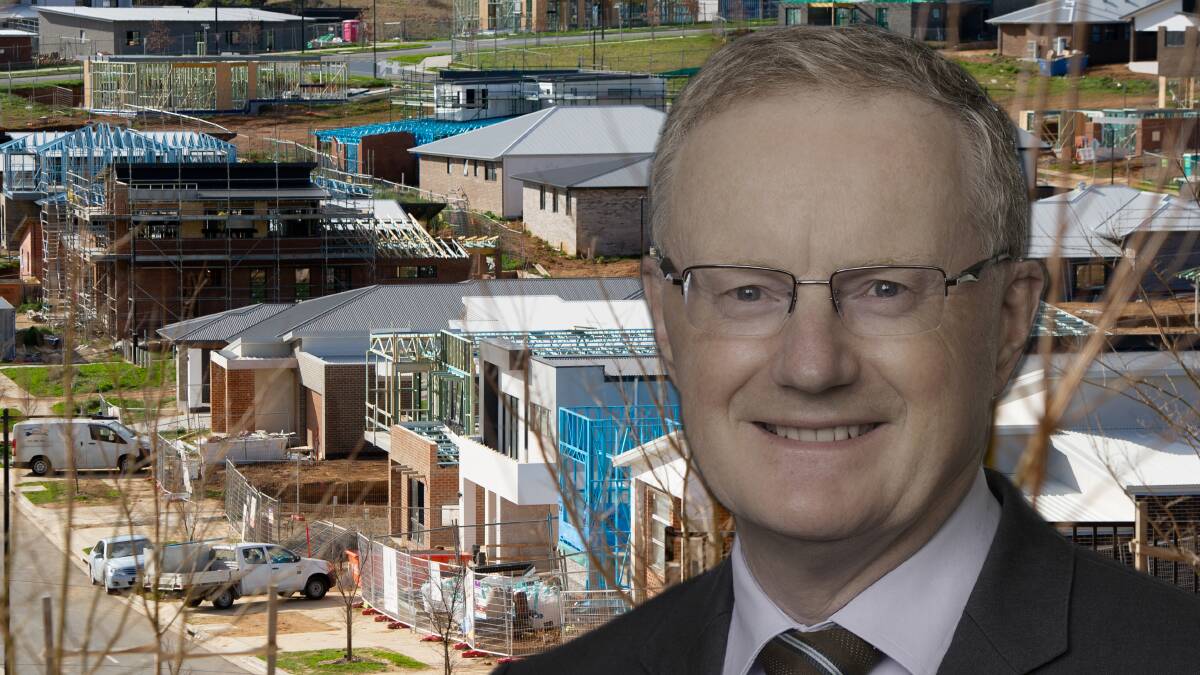The interest rate pain of borrowers is set to deepen after the Reserve Bank of Australia flagged that more rate hikes were likely in coming months as it tries to tamp down inflation.
Subscribe now for unlimited access.
$0/
(min cost $0)
or signup to continue reading
In a widely tipped move, the Reserve Bank of Australia decided to hike its cash rate by 0.25 of a percentage point to 3.35 per cent, adding $21 a week to repayments on a $600,000 standard variable rate mortgage.
ANZ was the first of the big banks to pass on the increase, announcing it would raise variable home loan interest rates by the full 25 basis points from February 17.
But, in unexpectedly hawkish comments accompanying the announcement, RBA governor Philip Lowe indicated more rate hikes are likely.
"The [Reserve Bank] board expects that further increases in interest rates will be needed over the months ahead," Dr Lowe said, citing stubbornly high global inflation and sustained strong domestic demand.

The RBA forecasts inflation to slow to 4.75 per cent by the end of the year but does not expect it to fall within its 2 to 3 per cent target band until mid-2025.
The governor acknowledged that the effect of the past eight rate rises had yet to be fully felt, making it difficult to assess how quickly and deeply consumer spending will slow.
But Dr Lowe voiced concern that persistently high inflation not only "makes life difficult...but could become entrenched in people expectations, [which] would be very costly to reduce later".
Adding to the central bank's worries is the possibility that the "very tight" labour market could fuel a damaging wage-price spiral.
The tone of Dr Lowe's remarks have caused markets to reassess their interest rate expectations.
Before the announcement many economists thought the central bank was close to putting rates on hold amid signs that demand in parts of the economy was slowing. But some, such as the Commonwealth Bank's Head of Australian Economics, Gareth Aird, have now upgraded their forecasts and expect two more rate hikes, pushing the cash rate to 3.85 per cent. Deutsche Bank economists predict rates could reach 4.1 per cent.
Mr Aird said he expected the economy to slow "considerably" this year, causing inflation to fall more quickly than forecast by the Reserve Bank.
Dr Lowe has flagged the prospect of more rate hikes despite the RBA assessment that price pressures peaked in the December quarter.
The governor said continuing strong demand in parts of the economy had helped push underlying inflation in the last three months of 2022 higher than had been expected, indicating that the central bank had more work to do.
He said the central bank would be paying close attention to conditions in the global economy and trends in household spending, employment and inflation in assessing how much higher rates need to go.
"The path to achieving a soft landing [for the economy] remains a narrow one [but] the Board remains resolute in its determination to return inflation to target and will do what is necessary to achieve that," Dr Lowe said.
The 0.25 of a percentage point rate hike will lift the average variable mortgage rate among the big lenders to 6.5 per cent but economists have warned of the risk that banks might increase their interest rates even higher because of higher funding costs on global markets. The size of average home loan repayments have climbed more than 60 per cent in the past nine months.
The latest hike will also intensify the financial hit to around 800,000 borrowers whose fixed rate loans are due to flip to variable rates during this year.
Following the rate hike announcement, Treasurer Jim Chalmers told Parliament the government understood the pressure households were feeling and was acting to support the RBA in its fight to curb inflation.
"We understand the inflation problem in our economy. We understand the pressure that high and rising interest rates [is putting on] families and the economy more broadly," the Treasurer said.
Dr Chalmers said the government's plan to help tackle the issue involved providing households with cost-of-living relief "in a way that doesn't add to inflation", working to strengthen supply chains and ease skills shortages and restrain government spending.
READ MORE:
But the Opposition is sharpening its attack on the government's handling of the economy, accusing it of deepening the inflation problem.
Opposition treasury spokesman Angus Taylor said a ninth rate hike showed the government was not doing enough to combat inflation.
"The reality is governments can provide relief from inflation by reining in spending but the Treasurer has thrown the goal of budget balance out the window," Mr Taylor said. "Hardworking Australians are paying more and more on their mortgages because this government can't get its priorities right."
Inflation accelerated to 7.8 per cent in the December quarter, its highest point in three decades and the shortage of labour in many areas and sectors is acute.
But Dr Lowe said the surge in spending following the lifting of COVID restrictions, particularly on services like travel and entertainment, "has largely run its course" and he expects consumption to become more constrained.
The central bank has forecast the economy to slow and grow by just 1.5 per cent this year and in 2024.
Although this will push unemployment higher, Dr Lowe said conditions in the labour market remain "very tight", raising the potential for a damaging prices-wages spiral.
Chief executive of national employer association Ai Group, Innes Willox, said the prospect of further rate hikes was "sobering" and urged restraint in pay claims and price increases.
"It is critical that businesses, governments and employees exercise moderation in price setting and wages negotiations and avoid fueling inflation and inflation expectations," Mr Willox said.


